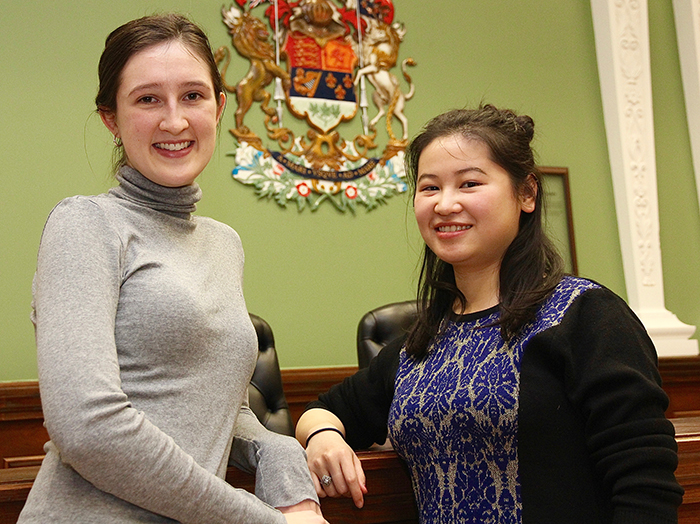Law program brings Indigenous issues to light
February 03, 2017

Paul Mayne // Western News
Rachel Phillips’ time at the Nishnawbe-Aski Legal Services Corporation (NAN Legal) in Timmins, Ont., was a definite eye-opener – both good and bad.
The second-year Law student recently spent three months in the northern Ontario Indigenous community, focusing on criminal and family law, as part of the Debwewin Summer Law Program, offered through Western.
“It was great being exposed to a different culture and learning about their concepts of justice, and how they differ from European ones but, also, in the more negative sense, being made aware of Indigenous realities in these different communities,” said Phillips. “But I so appreciate that I am aware of that now, and I think since having that first-hand exposure to these circumstances, I wish more people did.
“There is a total lack of understanding about the root causes of some of these issues but, as soon as you see it, and are engaging with them on an individual level, it’s not just a concept anymore or some theoretical issue.”
The Debwewin Summer Law Program is a summer internship program funded jointly by the Ministry of the Attorney General’s Indigenous Justice Division and Ontario law schools, including Western. The program was created in response to Justice Frank Iacobucci’s 2013 First Nation Representation on Ontario Juries Report.
Law students spend summer internships within Indigenous organizations and provide community education and legal assistance support to First Nations, Métis or Inuit communities and community organizations in Ontario.
Valerie Oosterveld, co-director of the International Summer Law Internship Program, said it’s important for Western to be part of the Debwewin internships.
“Not only do these internships provide Western Law students with direct experience working with Indigenous organizations, they expose our students to the realities behind Indigenous over-representation within our criminal courts and prisons,” said Oosterveld. “The internships allow our students to participate in local efforts to provide meaningful access to justice by and for Indigenous peoples.”
Western student Grace Zhang also participated in the program at the Tyendinaga Justice Circle near Belleville. She had the opportunity to travel to a remote First Nations community in Wabaseemoong, seeing first-hand the difficult living conditions in the north of the province.
Zhang mainly worked with youth involved in the criminal justice system, finding many struggling as a result of fetal alcohol syndrome and substance abuse. Many had been moved numerous times, through different group homes, and had been cut off from their cultural identity as First Nations youth.
“It gives you a different perspective on the law,” said Zhang. “You know there are issues, but you don’t really know what they look like, so it was really eye-opening to see kids struggle with substance abuse and how it relates to how they don’t have a central culture, because of the issues that have happened.”
Zhang had the chance to work on creating a court worker position so Indigenous youth would have a central contact to help them access Aboriginal justice and related services, along with organizing public legal education nights on family, criminal and small claims law, legal aid and juries. She also had the opportunity to be involved in diversion activities, including justice circles, which look to deviate youth from the criminal justice system.
“Every community is different, and our laws don’t really correlate to the situations in Aboriginal communities. It’s an area a lot of lawyers don’t get exposure to,” said Zhang, adding her experience with the justice circles was powerful. “It was interesting to participate in them, because if you participate, you are expected to share information about yourself. You don’t get to experience that in a professional setting, where you’re told not to be emotional or open. With justice circles, it’s okay to cry and share what you’re feeling.”
Phillips said she spent a great deal of time attending first appearances in criminal court, youth justice court and bail court, to keep records of the progress of clients’ cases, assist Indigenous accused navigate the process and to conduct interviews to complete Legal Aid Ontario applications.
She also produced resource materials on a variety of family and criminal law topics, including jury selection, child protection cases and the Child and Family Services Act, the stages of a criminal trial and common terminology in criminal and family law.
Her most meaningful experiences came from conducting interviews for Legal Aid applications, where she heard people’s stories and problems with the law and could see how systemic injustices directly impacted the lives of Indigenous peoples.
“You see so many different issues, some that you anticipated and some that you didn’t. It was not like a regular internship,” said Phillips. “There are some that are more mainstream, like poverty and substance abuse, but some are more specific to Indigenous communities.”
One issue that came up for her was geography – the fly-in only communities. For people living in these remote communities, simply getting to a court to have access to justice is a barrier, she added.
“I see now how these concepts, and seemingly far away historical things, are manifesting themselves in the problems of today,” said Phillips. “I think if more, not just lawyers and law students, but more people had this first-hand interaction, we wouldn’t have a lot of these issues that we have.”






